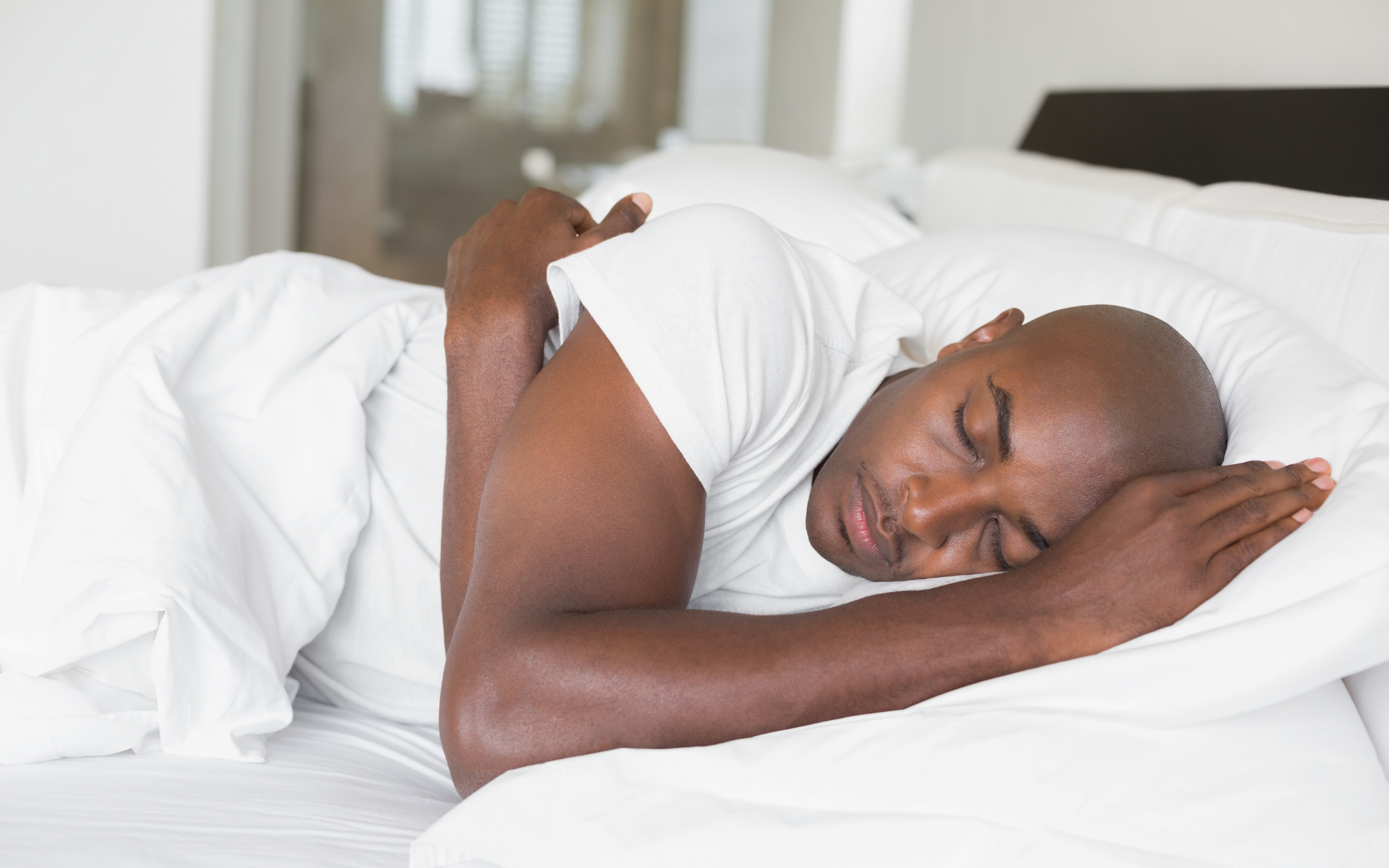Stress impacting your sleep? Tips to help sleep more & stress less

How has your sleep been lately? Are you sleeping the recommended 7 to 9 hours per night and waking most mornings feeling rested? If the answer is no, you’re definitely not alone.
Even before COVID, over 35% of adults were not getting enough sleep, and that was before the situation we currently find ourselves in. Just one month into the pandemic, way back in April of 2020, the use of prescription sleep medication had already increased by 20% in the US. It will be pretty fascinating (not in a good way) to see what sleep statistics look like once the pandemic is finally behind us and researchers can assess the full impact.
Regardless, it’s safe to say that existing sleep issues have been exacerbated by the pandemic, and many previously good sleepers are now experiencing insomnia. Why? In short, chronic stress.
While COVID hasn’t affected everyone in the same way, there are some themes that are pretty universal and are causing elevated stress levels for most of us:
So, that mostly sums up the why. But the how is also worth looking at.
When stress levels increase, it triggers a physiological response in our bodies, specifically an increase in the production of cortisol.
What is Cortisol?
Cortisol is a hormone that is produced and secreted by your adrenal glands via a complex communication system involving your hypothalamus, pituitary, and adrenal glands. The hypothalamus and pituitary glands are in your brain and the adrenal glands are just above your kidney. This network is called the HPA axis for short.
When you’re stressed, the HPA axis cues the release of cortisol, putting you in “fight or flight mode”. This response was perfect in early human times when fast reactions and an energy surge meant the difference between life and death. But it’s disproportionate to feelings of stress that come from watching the news or having a bad day at work.
Unfortunately, our adrenal glands don’t know the difference. Constantly elevated cortisol levels as a result of an overactive HPA axis can have a significant impact on our sleep cycle, our daytime stress levels, and our overall well-being.
Stress and sleep
Each night, your body goes through several sleep cycles: stage 1, 2, 3 and REM sleep. They have different qualities and functions but are all important.
When your HPA axis is overactive and too much cortisol is secreted, it disrupts your circadian rhythm and sleep cycle. This can cause difficulty getting to sleep, fragmented sleep with frequent waking, insomnia, and shortened sleep time overall.
To make matters worse, sleep deprivation at night causes more cortisol secretion during the day, possibly in an effort to stimulate alertness when you’re tired. So, the cycle keeps repeating itself and getting worse.
This is sometimes referred to as “adrenal fatigue” or “burn-out”. Your adrenals aren’t actually fatigued. It’s more a matter of them being dysregulated. In other words, they are no longer producing the right amount of cortisol to keep you safe and healthy. Over time, this heightened response to chronic stress can lead to fatigue, depression, insomnia, anxiety, brain fog, low libido, inability to handle stress, and lowered immune function.
Sounding familiar?
Stress and the immune system
The immune system is made up of billions of cells that travel through our bodies. They move in and out of tissues and organs, defending the body against foreign attackers, such as bacteria, viruses and cancerous cells.
White blood cells are the body’s main immune cells and they are divided into two types: lymphocytes and phagocytes. Lymphocytes will fight viruses and bacteria by releasing antibodies into the fluids surrounding cells and locking onto infected cells to destroy them.
When our bodies are under stress and our sleep is compromised, this response is weakened, leaving us more vulnerable. When we’re experiencing a case of short-term stress, like a specific situation that only lasts a few hours, we can bounce back. But when the stress is chronic and long-lasting, our immune system gets compromised.
And if you suffer from urinary tract infections (which are essentially inflammation in the bladder), stress and its impact on our immune function can leave you vulnerable to more frequent UTIs. If that wasn’t enough, stress and anxiety can increase the severity of UTI symptoms and, of course, the symptoms themselves increase your stress levels.
What can you do?
The first step to improving stress and sleep levels? Try to reset your circadian rhythm and get your sleep cycles back on track. To do this, there has to be a foundation of self-care.
Here are a few tips for getting a stressed-out sleep cycle back on track:
- Get to bed before midnight. Healthy adrenals will produce the least amount of cortisol between midnight and 4 am. You want to be asleep during those times to let them rest, repair, and get back into the rhythm. Wake up at the same time every day, even if you didn’t sleep well, and don’t nap.
- Sleep in a cool, dark room with a comfortable mattress. A sleep mask can help to make it extra dark.
- No screens before bed. For at least an hour. Sorry, not sorry.
- Get natural light as soon as possible after you wake up. If you’re planning to exercise outdoors, do it in the early part of the day to help with your sleep. Exercising before bed has the opposite effect.
- Eat well. Eat a balanced diet and avoid sugar and processed food. If you need a bedtime snack, avoid anything sugary or high in simple carbohydrates (like toast). A handful of almonds or walnuts is an excellent option.
- No caffeine after noon. Once again, sorry - but not sorry at all.
- Manage your stress response during the day with meditation, breathwork, yoga, a bath, a massage, a walk outside, other exercises, reading, or anything else that makes you feel calm.
Natural supplements to consider
The above tips are mostly designed to help your body really get the message of when to sleep and when to be awake. This is a challenging process that will take time and effort to re-regulate.
If you find these tips alone are not enough, you may want to look into Niyama’s Sleep & Stress Dream Team: a bundle that contains both the Sleep Like Buddha melatonin-free natural sleep aid and the Daytime Zen Stress Support.
Our suggestion? Take 1 capsule of Sleep Like Buddha 30 minutes before bedtime (and a second capsule if you wake at 2 am with a busy brain) to relax into a deeper sleep. Then, take 1 capsule of Daytime Zen as soon as you wake up to reduce cortisol secretion during the day and feel calmly alert.
Both supplements can be used separately, but are incredibly effective as a system. They may take several days for you to notice the benefits, but within a week most people find significant improvement in their sleep and stress levels overall.
Want to try these supplements at a special price so you can start enjoying a better night sleep? Save 10% off all Niyama supplements when you use code UTIVA10 at checkout.
To combat UTIs caused by stress or lack of sleep, take Utiva’s Cranberry PACs supplement daily. This supplement is clinically proven to stop bacteria from spreading in the urinary tract, preventing UTIs in the process.
As always, read full directions and contraindications to determine if any new supplement is right for you. If you have questions, chat with your pharmacist or health care practitioner, especially if you are on other medications.
Be kind to yourself
Above all else, take it easy on yourself. We’ve all been through a lot and we don’t always give ourselves credit for it. You are doing amazing, even if it doesn’t feel that way all the time. The most important thing is that you’re taking care of your body and mind.
References:
https://www.sleepfoundation.org/how-sleep-works/sleep-facts-statistics
https://www.sleepfoundation.org/sleep-guidelines-covid-19-isolation
https://www.healthline.com/health/cortisol-and-sleep#whats-cortisol
https://thriveglobal.com/stories/got-adrenal-fatigue-do-these-6-things-to-help-you-sleep/
https://health.clevelandclinic.org/what-happens-when-your-immune-system-gets-stressed-out/
Knowledge is power
Sign up to our newsletter to keep learning!

- Choosing a selection results in a full page refresh.
- Opens in a new window.





